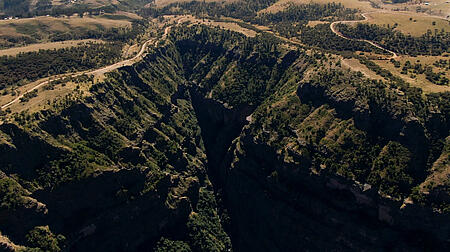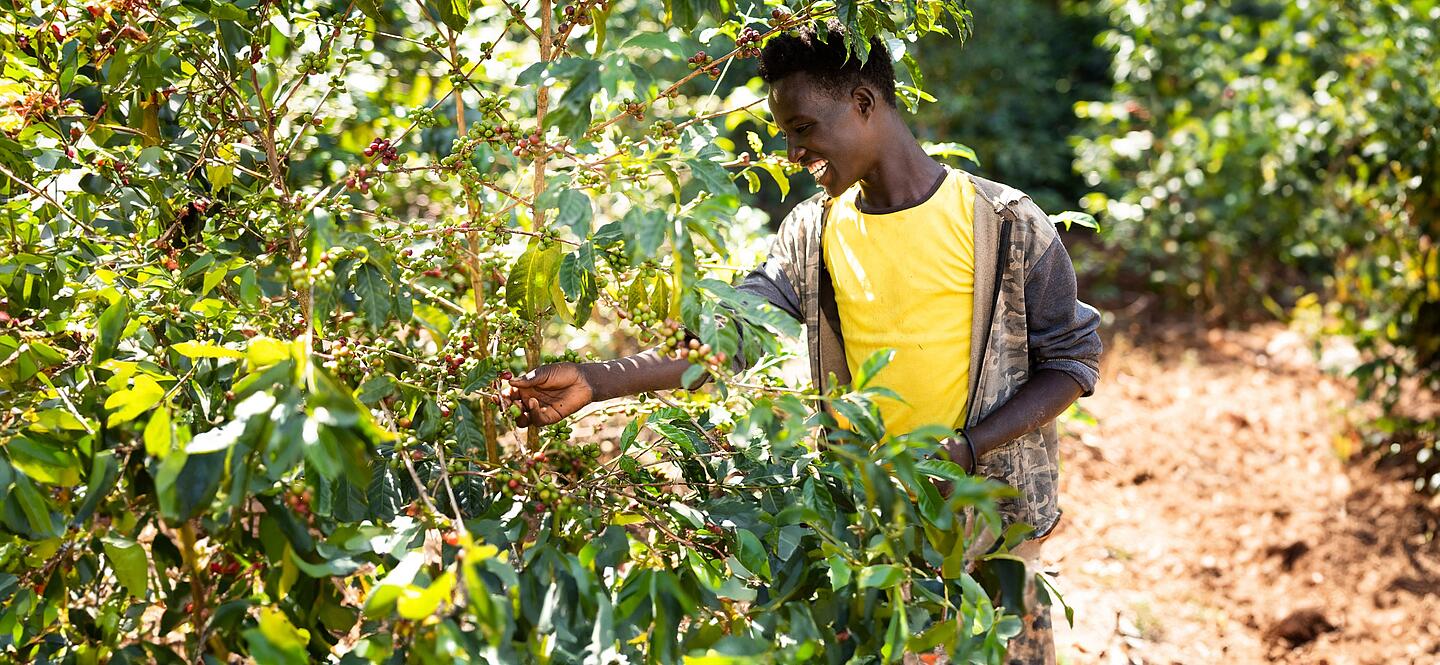
Commitment in the country of origin
Greener. Stronger. More sustainable.
The story of Dallmayr coffee begins in Ethiopia: in the early 1960s, Konrad Werner Wille – the founding father of today’s coffee business – travelled to Ethiopia in search of special green coffees. In the original home of coffee, the “coffee pioneer” discovered coffee beans of extraordinary quality – beans that continue to define the flavour of our coffee varieties today.
Together with “Menschen für Menschen” for Ethiopia
Coffee from Ethiopia is incredibly important to Dallmayr. That’s why we feel a special bond towards the country and provide long-term support, together with the “Menschen für Menschen” foundation. We regularly visit Ethiopia to see the coffee and progress of our project work for ourselves. By helping people to help themselves, we are improving the living situation of the local population in Ethiopia and are boosting people’s prospects for the future.
The original home of the coffee bean
Ethiopia is one of the world’s most important coffee-growing countries. The East African country is home to several of the finest coffee varieties. Coffees such as “Sidamo” or “Yirgacheffe” are among the most sought-after varieties for coffee buyers around the world. However, that hasn’t always been the case. Around 90 years ago, when the young Bremen merchant Konrad Werner Wille was establishing the Dallmayr coffee department, the entire Ethiopian coffee harvest consisted of just seven sacks. He wasted no time in importing them to Germany. The coffee pioneer travelled through Ethiopia himself for the first time in the 1960s – an arduous journey that involved him travelling on the back of a donkey. In the fertile southern provinces of Sidamo and Harrar – the original home of coffee – he discovered beans of extraordinary quality. Konrad Werner Wille recognised their potential and made his first business contacts. For a long time, Dallmayr purchased the entire Ethiopian coffee harvest. Even today, the country’s highland arabica beans continue to define the characteristic flavour of Dallmayr coffee.
More than 55 million tree seedlings
Since 2008, we have been supporting the reforestation programmes of the “Menschen für Menschen” foundation. To date, we have the donated more than 55 million tree seedlings.* These trees would cover an area about the size of 4,000 football pitches.
* Last updated: July 2024
Who does “Menschen für Menschen” support – and how?
The foundation, created by Karlheinz Böhm in 1981 following his appearance on the German television show “Wetten, dass..?”, helps people in Ethiopia to build a better life for themselves. Its projects help by giving people courses on how to better irrigate their land, to improve their harvest and to fight soil erosion. This helps farmers increase their income, they can build up reserves for times of need and, as a result, can tide themselves over during periods of drought.
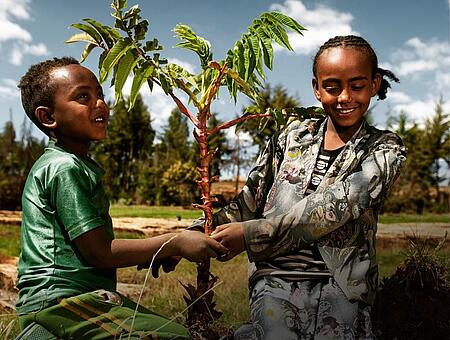
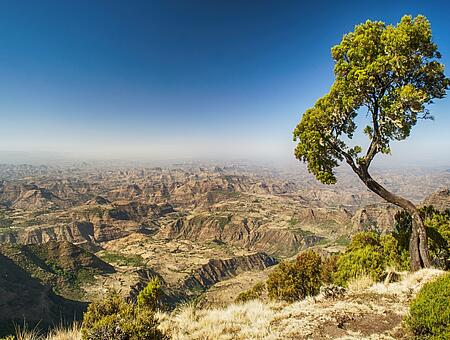
Africa’s soil is under threat. Each year in Ethiopia alone, enormous tracts of land turn into desert – only 13% of the country remains covered by forests. The reasons for this are complex and include overgrazing, deforestation for urgently needed firewood, population growth and climate change. These factors cause desertification of the soil or large areas of fertile land to be washed away. The local people, who for the most part live from farming, end up losing their livelihoods.
Planting the future together
With our seedling campaign, we are helping to tackle the root of a major problem in Ethiopia – the threat of desertification. The trees that grow from the seedlings planted in the “Menschen für Menschen” foundation’s tree nurseries improve the quality of the soil and prevent soil erosion. To help sustainable reforestation, farmers are trained in how to conserve resources. Furthermore, selected areas of land are designated as protected, where no livestock can graze and no timber can be cut. To compensate for these protected areas and to improve motivation, farmers receive seedlings for fast-growing trees, vegetable seeds and fruit tree seedlings. The latter are especially popular because their fruit can be sold on the market. Each year, “Menschen für Menschen” grows up to 7 million seedlings in the tree nurseries for replanting and reforestation.
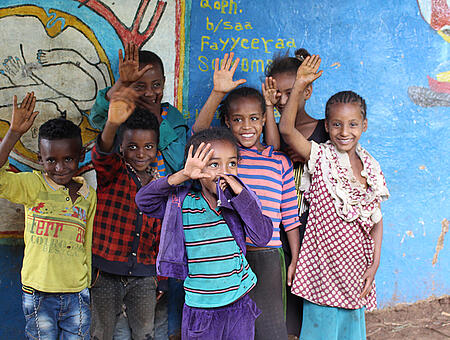
Dallmayr school for 1,000 children
In September 2018, together with the “Menschen für Menschen” foundation, we began work on a further project: the construction of a Dallmayr school for more than 1,000 children aged 7 to 16. The school is located in the project area of Dano – around 200 kilometres west of the capital Addis Ababa. The people there live in very modest conditions, predominantly from farming and cattle breeding. By building the school and providing all of the equipment, such as furniture, school materials and books, we are supporting the children on their path to a better future. The construction of three new classroom blocks, an administrative building with a reading room, and two buildings with sanitary facilities was completed in summer 2020 and opened in spring 2021.
We visit the construction site: from the ground-breaking ceremony in 2018 to the completion of the region’s most modern and advanced school in 2020.
How is the Dallmayr school changing people’s lives?
Six out of ten children in Ethiopia aren’t able to go to a school that is appropriate for their age. Around 43% of men and 59% of women are illiterate. However, education is the key to fighting poverty, and boosts people’s prospects for the future.
Better opportunities for the children
The existing schools in rural areas are often in a very bad condition. The old school in the village was originally constructed using straw, wood and clay. It had small openings for windows, and large parts of the walls were crumbling after being infested by termites. There wasn’t much light in the classroom, and the air was so stuffy that many children suffered from chronic respiratory diseases. The new Dallmayr school changed everything: the classrooms are bright and well ventilated, making it easier for the pupils to concentrate on their lessons.
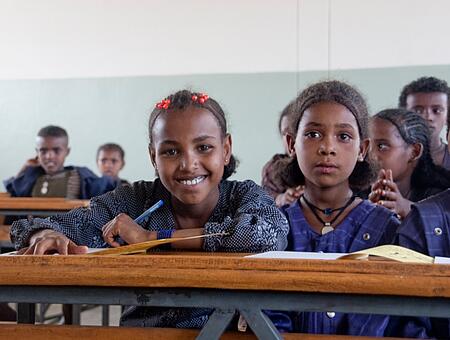
Nobody has to take a rock with them to sit on – there are enough benches, chairs and schoolbooks for everyone. What we at home regard as normal should now become a reality in Ethiopia.
Clean drinking water for 3,400 people
Our project to construct wells was funded by the sale of Ethiopian coffee during sustainability promotions with our trading partners. As a result, the strenuous and dangerous task of fetching water from far-away sources is no longer necessary and around 3,400 people* now benefit directly from 25 wells of various design.
* Last updated: July 2023
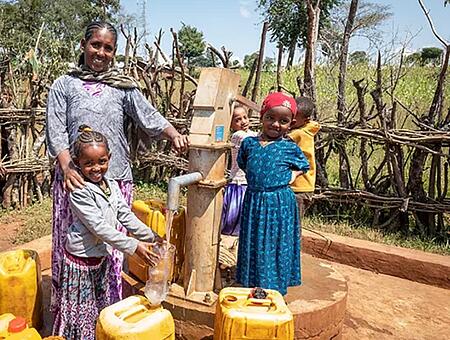
Why do wells help children and girls in particular?
Around half of the people in Ethiopia have no access to clean drinking water. The consequences of this can be deadly, as dirty water can cause life-threatening infection and disease. The mortality rate is high, especially among children. Having wells available for clean drinking water not only improves people’s general health, but also education. Fetching water is a job traditionally carried out by women.
Since the girls no longer have to do this task, they have more time to go to school. It’s a major step towards equal opportunities in education.
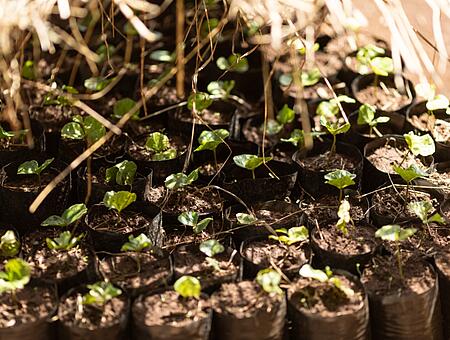
Developing a coffee cooperative
With a new coffee region and coffee cooperative, we are creating long-term prospects and permanent jobs for people in Dano, where the project is taking place. There, the local people farm coffee at altitudes of 1,500 to 2,500 metres, exclusively for the local market. Together with the “Menschen für Menschen” foundation, we are providing further impetus for coffee cultivation in the region and are developing a sustainable coffee cooperative.
The trees in Dano may still be young, but there is huge potential. The land stretches across a high plateau and is ideal for cultivating coffee. Development is initially scheduled to run for three years and is also supported by the German federal state of Bavaria.
How progress is being made at the coffee cooperative
Dano was once covered with coffee trees at altitudes of up to 2,500 metres – but then deforestation and overgrazing destroyed the enormous potential this had offered. Now, there is hope. In close cooperation with the local farmers, a new coffee region and coffee cooperative are now being established in the area. What was once a modest area of some 400 hectares – previously farmed exclusively for the local market – is being gradually expanded to 2,000 hectares.
It’s hard to believe just how much the unused land is being transformed and how it is creating real prospects for the local people. In a low-lying depression surrounded by the Waji river, which serves as a water source, around 900,000 pest-resistant coffee seedlings are currently sprouting in the “Menschen für Menschen” foundation’s tree nurseries. Every morning and evening, the workers water the young plants in this lush, green oasis, where pineapples and avocados ripen alongside the coffee.
The Baro coffee tree nursery, located on the high plateau of Dano, is at the very centre of this comprehensive reforestation and development project. The cooperative is expected to create around 50 new jobs for young adults in the region. More than 1,200 farmers are being trained in new methods of coffee cultivation, with the aim of increasing agricultural productivity and generating more income as a result. This includes, for example, pruning the coffee bushes, covering the roots with straw, weeding or fertilising the soil.
A taste of the Dano cooperative
The first harvests were so promising that the cooperative’s sustainable coffee is now available at the Dallmayr delicatessen and in our online shop. “Cooperative Dano” is a part of the Dallmayr Röstkunst range. By purchasing this wholly exceptional coffee, you are also supporting the local people in Dano.
Better all around
“We are taking a holistic development approach that considers all aspects of sustainability. Our support for the area’s reforestation programmes has already helped to lay the foundations for a fertile coffee-growing region. By building the new Kekero Jibat Higher Primary School, we are supporting education and social development in the region, while the coffee cooperative and its coffee infrastructure will help to create long-term prospects for the local people.
We received the German Award for Sustainability Projects in 2021 – which confirms that we are on the right track with our project work at the coffee origin.”
Julia Dengler, member of executive management
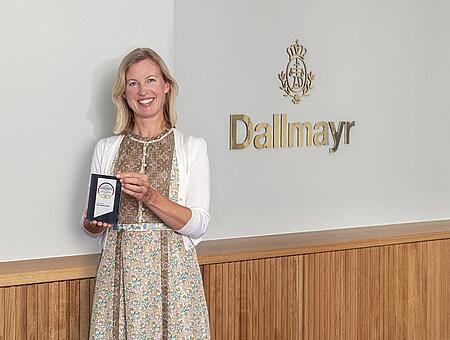
Our holistic development approach
Dallmayr
project work
in Dano
Cultivation of pest-resistant
coffee plants
Avoidance of chemical fertilisers
and pesticides
New jobs,
in particular for young people
A secure income
for farmers and their families
More know-how
through training
Close partnerships with
smallholders
Improvements
to education
